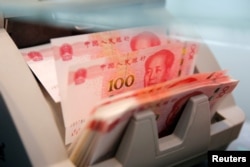Discussions are underway for the opening of Chinese banks in Bolivia as La Paz officials consider following the controversial path already taken by Brazil and Argentina to trade with China in its currency, the yuan.
The Chinese ambassador to Bolivia, Huang Yazhong, made the announcement earlier this month.
"We are working to encourage Chinese commercial banks to open offices in Bolivia."
In his mid-term report in May, Bolivian President Luis Arce referenced Brazil and Argentina as two close countries that have agreements with China to trade in the yuan rather than in dollars, a path that he said Bolivia would follow because "the region is shifting towards that." A date has yet to be announced as to when that could happen.
The president of Santa Cruz Department of Businesses, Oscar Justiniano, assured that progress was being made in the opening of Chinese banks in Bolivia to promote foreign trade.
"That takes time due to regulatory aspects, but we seriously hope that it can be done because at the end of the day, what you must do is use less dollars and have both countries pay with their own currency, Bolivianos and Yuans. In our case, both currencies are stable," Justiniano explained during a national TV interview.
Currency woes
Switching to the yuan can help solve the currency exchange crisis in Bolivia, said Arce.
The shortage of dollars has worsened in the last three months, and Bolivians have faced restrictions on banking operations in the U.S. currency.

Initially, the national government minimized the financial situation and later proposed to meet the high demand for dollars from the Central Bank of Bolivia itself through direct sales, but the demand continues. There is a waiting list to acquire the dollar and a parallel exchange market has been formed.
"The lack of investment in the hydrocarbons sector, the gradual reduction of international reserves and a high fiscal deficit are some of the causes of the problem," said Jaime Dunn, a financial consultant in Bolivia.
Bolivia has also seen a growth in fuel imports, which in 2022 reached $4.2 billion, 2% of total imports, while gas exports fell to $3.4 billion.
Latin America and the yuan
Bolivia is the third country in Latin America to consider using the Chinese yuan for trade.
In Argentina, the government announced in April that its purchases from China would begin to be paid in the yuan instead of dollars, to preserve its weakened international reserves.
As of March in Brazil, the yuan has supplanted the euro as the second-largest foreign reserve currency, according to a central bank report. The government announced an agreement to trade with China in the currencies of both countries, the yuan and Real, and avoid resorting to the dollar.
"If South America unites as a region, it can be a regional counterweight. To the north we share our continent with a superpower, like the United States, and obviously, in that context, there are interests," said Bolivian Foreign Minister Rogelio Mayta in an interview with Chinese state media CGTN.
Opponents of the yuan
Still, discussions about switching to the yuan has aroused doubts and concerns among some in Bolivia.
The problem of the national government is a "structural denial of the crisis in Bolivia" and that is why "distractive measures are taken that are not aimed at solving the crisis," opposition senator Cecilia Requena told VOA.
"The yuan does not have the conditions to be an internationally accepted currency because it has many exchange restrictions, and they are strongly determined by politics in a non-transparent manner," added Requena.

Economist and former director of the Central Bank of Bolivia, José Gabriel Espinoza, told VOA the announcements about the yuan are more politically driven to mitigate the expectations of the population due to the lack of dollars.
"You have to understand that in Bolivia and probably in the region, a large part of the consumer goods come from contraband. They do not come from Chinese markets or intermediaries in that country but are bought from secondary markets. This means resale, and for this the dollar is used," Espinoza said.
A large part of the Bolivian economy is based on informal sales, where vendors sell items without paying taxes.
"Implementing a compensation mechanism as proposed by President Arce between China and Bolivia directly would be very ineffective because it would require the formalization of the economy," added Espinoza.
For a currency to be effective globally, it must have a very high degree of demand, said financial consultant, Jaime Dunn.
Ninety percent of transactions are made in dollars, 60% of the Swift system (which facilitates the movement of capital between countries) is in dollars and the yuan is less than 2%.
One yuan is currently equivalent to 0.14 dollars and 0.98 bolivianos.
"Bolivia does not have the conditions for a change from the dollar to the yuan currently because all the income from imports and exports that the country makes go to markets where we are paid in dollars and imports are also in dollars. On the other hand, we also have a trade balance with China that is negative," explained Dunn.
Many experts say they do not think it is likely the dollar will lose its dominance in the near future.
Bolivia's ties with China
In Bolivia, analysts said replacing the dollar with the yuan could not be implemented in the short term, but it is possible for bilateral trade.
"Transactions with countries are one thing and transactions with the Chinese yuan that could be handled at certain levels are another thing. But in daily activity, dollars or the national currency will always be handled, and it will hardly happen that it will be replaced by the yuan," said Dunn.


